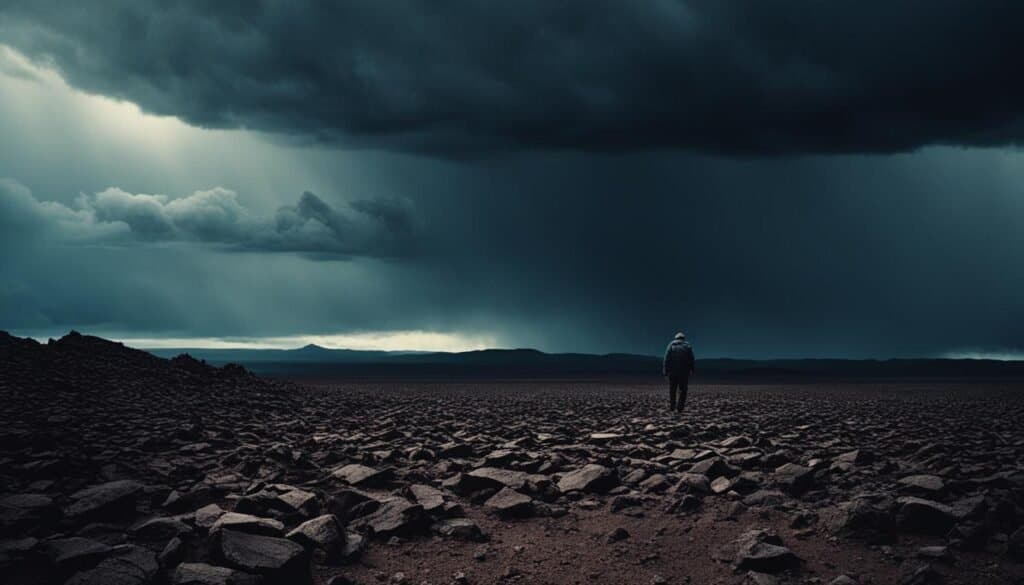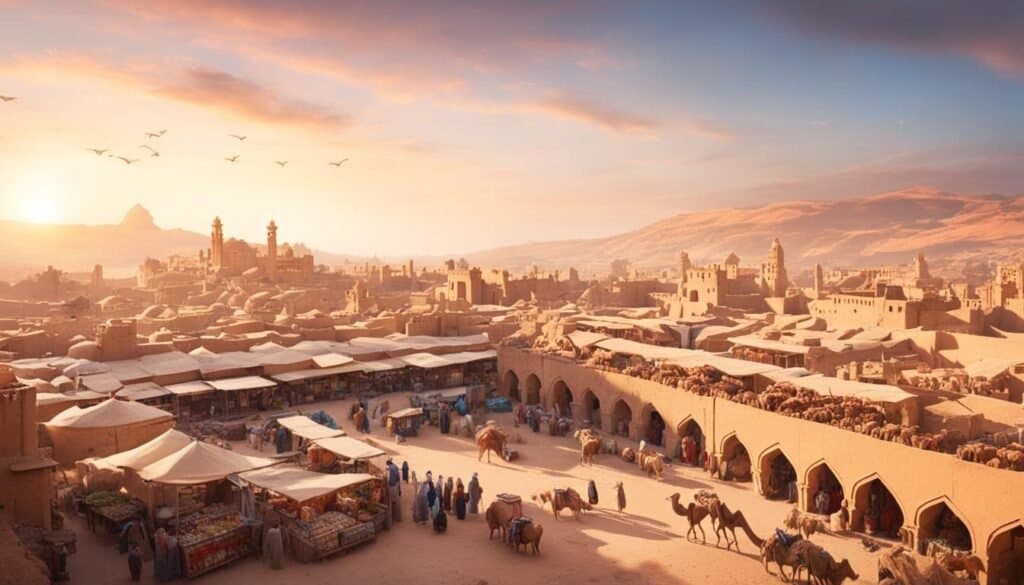Have you ever thought about the places in the book of Genesis? Wondered why they are important? We’ll look at ten key locations that were vital in biblical history. These places still draw our interest today.
The Garden of Eden and the Tower of Babel are just the beginning. Each spot has its own story and lessons. We’ll uncover the depth of biblical history tied to these locations.
Get ready for a journey through time and stories. It’s time to reveal the hidden insights of these incredible places.
Key Takeaways:
- Genesis mentions ten significant geographic locations that hold immense biblical importance.
- These locations shaped the stories and events found in the Bible.
- Each location carries its own symbolism and meaning.
- Exploring these locations provides insight into biblical history and its lessons.
- Join us as we uncover the secrets and insights hidden within these remarkable places.
The Garden of Eden: An Imagined Paradise
When we think of the Garden of Eden, we often see a perfect place. Adam and Eve lived there in peace with each other, nature, and God. This place, from the book of Genesis, is an important part of biblical history. It’s a strong symbol of the perfect life before challenges came.
The Garden of Eden was full of greenery, rivers, and trees with plenty of fruit. It was a perfect spot. God walked and talked with Adam and Eve there. They were lucky to be in God’s company.
“And the LORD God planted a garden in Eden, in the east, and there he put the man whom he had formed. And out of the ground the LORD God made to spring up every tree that is pleasant to the sight and good for food. The tree of life was in the midst of the garden, and the tree of the knowledge of good and evil.” (Genesis 2:8-9)
Adam and Eve lived in perfect peace with God and nature. They took care of the garden, making sure it was full of life. Life for them was joyful and without trouble.
But Eden also was a place of choice. There was the Tree of the Knowledge of Good and Evil. God told them not to eat its fruit. He explained what would happen if they did.
Adam and Eve broke the rule and ate the fruit. This action brought sin into the world. They were then forced to leave Eden. It was the beginning of many struggles for humanity. The garden was closed off, guarded from reentry.
The Garden of Eden stands as a big symbol for today’s believers. It’s a reminder of falling from God’s grace and needing to find our way back. It encourages us to fix our relationship with God. Then, we can look forward to a new paradise where we’re close to our Creator.
The Garden of Eden in Art and Literature
The Garden of Eden has inspired artists and writers for centuries. Art often shows it as a perfect paradise. These paintings and sculptures try to show how beautiful and peaceful the garden was. They make us think of what was lost.
Writers have also been captivated by the Garden of Eden story. Many have written poems, stories, and novels about it. They explore deep questions about human nature and choice. The Garden of Eden’s story makes us think about life and our role in it.
The Land of Nod: A Place of Isolation and Consequences
After Cain killed his brother Abel, he had to leave God’s presence. He started wandering the earth. He settled in a desolate place called the Land of Nod, located to the east of Eden. The Land of Nod reminds us of the isolation and results of sin.
The name “Land of Nod” suggests aimless wandering. It means living without God’s care, facing loneliness. Burdened with his crime, Cain lived in this bleak land. It shows how severe sin’s consequences can be.
“And Cain went out from the presence of the Lord and dwelt in the Land of Nod, on the east of Eden.”
Cain felt isolated in the Land of Nod. But even there, God showed him mercy. God protected Cain so no one would harm him, showing His love despite our flaws.
The Land of Nod story teaches about sin’s separation from God and each other. It warns us of sin’s damage, urging us to reconcile with God and others.
Lessons from the Land of Nod
The Land of Nod teaches us lesson for today. It shows that we should own up to our mistakes, seeking forgiveness and repairing what we’ve broken.
We’re also urged to look at our lives. We should fight against personal and community sin, working for a peaceful, united world for all.
The Land of Nod – A Place of Redemption
While the Land of Nod showcases sin’s impact and isolation, it also shines with God’s love and grace. God can bring redemption and healing to any broken place.
Just as He protected Cain, God offers us a chance to change and accept His mercy. The Land of Nod, therefore, symbolizes hope in God’s healing, no matter our past mistakes.

Mount Ararat: A New Beginning and God’s Covenant
Making a significant appearance in biblical history, Mount Ararat plays a crucial role in the tale of Noah and the great flood. This majestic mountain was where the ark came to a stop, symbolizing a fresh start for everyone. It marked the beginning of a covenant between God and Noah.
The story in Genesis shows the earth’s destructive flood, caused by human wickedness. God, however, chose Noah to save because of his righteousness. Noah was tasked to build an ark, saving his family along with representatives of all living species. When the flood waters receded, the ark landed in Mount Ararat, offering a restart for humanity and a renewed divine connection.
“And the ark came to rest on the mountains of Ararat.” – Genesis 8:4 (NIV)
In modern-day Turkey, Mount Ararat stands out as a striking and significant peak in the Armenian Highlands. It rises over 16,000 feet, providing a fitting setting for the Genesis narrative. This location captures the minds of both believers and explorers with its dramatic history.
Though the precise spot where the ark settled remains debated, Mount Ararat’s grand presence symbolizes God’s immense power. It signifies hope following devastation.
The Sacrifice of Issac on Mount Moriah
Another important mountain in God’s story is Mount Moriah. This hill, likely the Temple Mount in Jerusalem, was where Abraham encountered a test of his faith and obedience.
God asked Abraham to sacrifice his son, Isaac. As Abraham was about to follow through, God showed him a ram to sacrifice instead. This event underscored God’s covenant with Abraham.
It was on Mount Moriah that Abraham’s test foretold the sacrifice of Jesus on Golgotha. There, the symbol of death became the way to eternal life and redemption.
Significant Mountains in Genesis
| Mountain | Significance |
|---|---|
| Mount Ararat | A new beginning after the flood and God’s covenant with Noah |
| Mount Moriah | A place of testing and obedience for Abraham |
| Mount Sinai | Where Moses received the Ten Commandments |
| Mount Horeb | The same mountain as Mount Sinai, where God appeared to Moses |
| Mount Carmel | The site of Elijah’s confrontation with the prophets of Baal |
In the Bible, mountains often symbolize significant moments of divine action, revelation, and testing. From Mount Ararat to Mount Moriah, these significant peaks show God’s faithfulness and His guidance through new beginnings.
The Tower of Babel: Human Pride and Diverse Languages
In the book of Genesis, the Tower of Babel stands out. It shows the diversity of languages and the nature of humans. The story focuses on Noah’s descendants who tried to build a tower to reach the heavens.
They aimed to make themselves famous by building this tower. They ignored God’s rules and wanted to be as great as Him. This defiance showed their pride and ambition.
However, God saw what they were doing. He understood that if they stayed united, they could achieve too much. So, he made them speak different languages, making it hard for them to work together.
This act not only stopped their tower but also moved them to different lands. Each group spoke a new language. The Tower of Babel became a symbol of language diversity, God’s power, and the consequences of human pride.
This story warns us to stay humble and recognize our limits, despite our goals. It encourages us to value the differences in languages and cultures. We should see these disparities as proof of God’s wisdom and control.
Comparing the Tower of Babel with Other Biblical Locations
| Location | Significance |
|---|---|
| The Garden of Eden | Symbolizes the perfect relationship between God, humanity, and nature |
| The Land of Nod | Represents isolation and the consequences of sin |
| Mount Ararat | Marked a new beginning for humanity and God’s covenant with Noah |
| The Tower of Babel | Illustrates human pride and the origin of diverse languages |
| Sodom and Gomorrah | Shows the consequences of wickedness and divine judgment |
| Bethel | Reveals a place of revelation and making vows to God |
| Haran | Serves as a pivotal point of decisions and changes in the patriarchs’ lives |
| Ur of the Chaldees | Signifies the beginning of God’s covenant with Abraham and his descendants |
| Egypt | Symbolizes God’s provision and divine providence |
| Moriah | Represents obedience and trust in God |
From the Tower of Babel tale, we take away important lessons. It warns of unchecked pride and celebrates language and cultural differences. It tells of our humility’s place in the world and our achievements.
Sodom and Gomorrah: Wickedness and Divine Judgment
In the book of Genesis, we learn about Sodom and Gomorrah’s wicked ways. These cities ignored what was right and lived in a very bad manner. Due to their wrongdoings, they faced a terrible ending. Exploring their story teaches us important lessons.

Background: Cities of Vice
“Then the Lord rained on Sodom and Gomorrah sulfur and fire from the Lord out of heaven. And he overthrew those cities, and all the valley, and all the inhabitants of the cities, and what grew on the ground.” – Genesis 19:24-25
These cities lay in the fertile Jordan River area, close to the Dead Sea. Though once wealthy, their evil ways brought about their ruin. Sodom was known for its unfriendly nature and sexual misconduct. Gomorrah, on the other hand, was filled with wickedness and worshiped false gods.
Divine Warning and the Rescue
A man of righteousness, Lot, lived in Sodom. Seeing the great evil, God decided to end both cities. Yet, He showed mercy by sending angels to save Lot and his family from the destruction.(3x)
“Sodom and Gomorrah twice mentioned in a row.”
The angels urged them to quickly leave and not look back. Sadly, Lot’s wife turned back, and essentially lost her life for it.
Divine Judgment: Fire and Brimstone
As daylight broke, God’s punishment hit Sodom and Gomorrah. Fire and brimstone fell from the sky, destroying everything, including its people.(3x)
This event shows us the serious outcome of sin. It reminds us of God’s fairness and dislike for ongoing wrongdoing. It also emphasizes the importance of a good life.
Lessons Learned
The story teaches us many lessons. Firstly, it shows that obeying God is crucial, and not doing so can lead to big trouble. It also warns about how tempting evil can be and how it ruins lives. Finally, it highlights God’s fair judgment and the need for choosing what is right over what is wrong(3x).
| Lessons from Sodom and Gomorrah |
|---|
| Disobedience leads to dire consequences |
| Wickedness and sin have destructive power |
| God’s judgment is righteous and just |
| Righteousness should be pursued, wickedness rejected |
Reflecting on Sodom and Gomorrah, we must learn from it. Let’s aim to do what’s right, avoid the wrong, and seek God’s guidance. His judgment is always fair.
Bethel: A Place of Revelation and Vows
In the book of Genesis, Bethel is a standout, known for its spiritual experiences. This ancient place in Canaan is rich in biblical history. “Bethel” means “house of God,” where Jacob encountered the divine in a life-changing way.
Jacob’s dream at Bethel is a famous story from Genesis 28:10-22. He saw a ladder from earth to heaven in his dream. Angels moved up and down it. God confirmed His covenant with Abraham and Isaac to Jacob. He promised Jacob land and countless descendants. When Jacob awoke, he realized the divine presence and called it “the house of God” and “the gate of heaven.”
For Jacob, this dream was a major moment. He vowed his life to God at Bethel. Jacob promised to serve God if protected by Him. The place where he had the dream became a symbol of this vow, marked by a stone pillar.
Jacob’s Bethel experience shows us God is found in unexpected ways. It teaches us to pay attention to moments that show God’s purpose in our life. As Jacob was changed by his time at Bethel, we also can be, by embracing God’s guidance.
Bethel: A Place of Spiritual Awakening
Bethel is known in the Bible for being a place of spiritual awakening. It’s a reminder that God can reveal Himself anywhere. We should always be open to acknowledging His presence and be thankful.
Bethel’s significance continues through the Bible. The story of Jacob’s dream inspires us to look for sacred moments with God in our lives. It encourages us to live by God’s will.
| Key Takeaways |
|---|
| Bethel, meaning “house of God,” is a significant location in the book of Genesis. |
| Jacob had a life-changing dream at Bethel, where he saw a ladder from earth to heaven and received a divine revelation. |
| After his experience at Bethel, Jacob made a vow to dedicate himself to God and declared the location as the “house of God.” |
| Bethel serves as a reminder to be attentive to divine encounters and to respond with gratitude and commitment. |
| The story of Jacob’s dream teaches us to recognize the sacred spaces in our own lives and to be open to God’s revelation. |

Haran: Pivotal Decisions and Changes
In Genesis, Haran becomes a key city where big decisions and changes happen. These events shape the stories of the patriarchs in important ways.
When Abraham’s family arrived from Ur, it was a critical moment. This choice started a huge change for them. They were guided by promises from God and their strong belief. Here, Abraham was told by God to go to Canaan. It’s where his family would get special blessings.
“Now the Lord said to Abram, ‘Go from your country and your kindred and your father’s house to the land that I will show you. And I will make of you a great nation, and I will bless you and make your name great, so that you will be a blessing.'” – Genesis 12:1-2
Many years later, Haran was crucial for Jacob too. He was running from his brother and found safety there. His time in Haran is full of twists with his uncle and cousins. This part of his life, with its ups and downs, played a big role in his future as the patriarch of the tribes of Israel.
Looking at Haran, we can see it was a place where life-changing choices were made. It was where important relationships started and faced tough times. It’s a key place showing the power of faith and following God’s path.
Pivotal Events in Haran
| Patriarch | Event |
|---|---|
| Abraham | Migrates from Ur to Haran |
| Abraham | Receives God’s call to proceed to Canaan |
| Jacob | Flees to Haran to escape Esau’s anger |
| Jacob | Marries Leah and Rachel in Haran |
Genesis shows Haran is more than a town. It stands for taking big leaps in faith. The patriarchs’ journeys there set the stage for the future of their families for years to come.

Ur of the Chaldees: The Beginning of God’s Covenant
Ur of the Chaldees is where Abraham started his journey. This city’s in what is now Iraq. It’s where God began a special relationship with Abram and his family.
This city was huge back then. It had big temples and lots of trade. Abram lived in this vibrant place.
God spoke to Abram here, telling him to leave. Abram trusted God enough to follow this new path. And so, a great story of faith began.
The trip from Ur to Canaan was hard. Abram left everything he knew because he believed in God’s plan. This decision changed the future for so many.
Journey from Ur of the Chaldees
Leaving Ur meant more than just moving. It meant choosing a new spiritual path. He left behind the worship of many gods for the belief in one true God.
The Lord had said to Abram, “Go from your country, your people, and your father’s household to the land I will show you.” – Genesis 12:1
By following God’s call, Abram set big things in motion. His faith and obedience were key to some amazing future events. This is why he’s honored as the “Father of the Faithful.”
The Impact of Ur of the Chaldees
Ur was vital for building Abram’s deep faith. Being at a crossroads, it was full of different cultures. This helped Abram prepare to share his faith with the world.
Abram’s story shows God’s love reaching everyone. His family was chosen to bring light to all, showing God’s love in action.
The Legacy of Ur of the Chaldees
Even though Ur eventually lost its glory, its story lives on. It shows how answering God’s call can make amazing things happen.
Abram’s journey laid the groundwork for God’s promises. His faith was crucial for the coming of Jesus. It shows God always keeps His word.
Looking back at Ur reminds us. God’s call to faith starts in everyday moments. Just like it did for Abram, God wants us to take special journeys of faith and purpose.
Egypt: God’s Provision and Divine Providence
Egypt is a key place in the Bible. It shows both challenges and God’s help clearly. The story of Joseph and the Israelites reveals God’s complex plan.
Joseph was sold into slavery but later became powerful in Egypt. He interpreted dreams and helped save the land from a big famine. This shows how God provided for Joseph and his family.
Later, the Israelites were enslaved in Egypt. But God had a plan to save them. He chose Moses to lead them. After many plagues on Egypt, they were set free.
“Let my people go, so that they may worship me in the wilderness.” – Exodus 7:16
The Egypt story in Genesis shows God’s care and the struggles of His people. It demonstrates how God works through tough times to fulfill His promises.
How Do the Geographic Locations in Genesis Relate to Its Mysteries and Ambiguities?
The geographic locations in Genesis offer rich symbolism, often intertwining with its mysteries and ambiguities. By examining ancient sites mentioned in the text, readers encounter “genesis unanswered questions” that challenge interpretations and inspire exploration. Each place serves as a backdrop for themes of creation, conflict, and divine interaction throughout the narrative.
Moriah: Symbolizing Obedience and Trust in God
In ancient Palestine stands Moriah, a place rich with biblical history. It symbolizes the deep trust and obedience we aim for in our faith.
The story of Abraham from Genesis highlights this symbol. God tested him by asking to offer his son Isaac as a sacrifice on Mount Moriah.
This demand stood against everything Abraham valued and his fatherly instincts. Still, he trusted God and went to the mountain with Isaac.
Abraham’s faith was clear as he got ready to sacrifice his son. However, God stopped him at the last moment. An angel appeared, sparing Isaac, and a ram was found for sacrifice instead.
Beyond this test, Moriah played a crucial role in history. It became the site for the Temple Mount in Jerusalem. This is a significant place for Jews, Christians, and Muslims.
Moriah’s story teaches us the value of trust and obedience in our faith. It’s a place of inspiration, reminding us of God’s tests and rewards.
Affiliate Disclosure: "As an Amazon Associate I earn from qualifying purchases made from links in this post. We are a participant in the Amazon Services LLC Associates Program, an affiliate advertising program designed to provide a means for us to earn fees by linking to Amazon.com."

